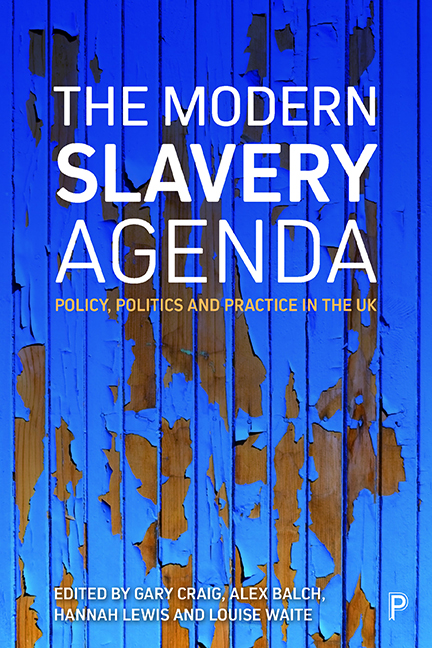Book contents
- Frontmatter
- Dedication
- Contents
- List of tables, figures and boxes
- Notes on contributors
- Editorial introduction: the modern slavery agenda: policy, politics and practice
- one Modern slavery in global context: ending the political economy of forced labour and slavery
- two The UK’s response to modern slavery: law, policy and politics
- three Defeating ‘modern slavery’, reducing exploitation? The organisational and regulatory challenge
- four Class Acts? A comparative analysis of modern slavery legislation across the UK
- five Child trafficking in the UK
- six Human trafficking: addressing the symptom, not the cause
- seven Still punishing the wrong people: the criminalisation of potential trafficked cannabis gardeners
- eight Modern slavery and transparency in supply chains: the role of business
- nine Migrant illegality, slavery and exploitative work
- ten The UK’s approach to tackling modern slavery in a European context
- Index
ten - The UK’s approach to tackling modern slavery in a European context
Published online by Cambridge University Press: 20 April 2022
- Frontmatter
- Dedication
- Contents
- List of tables, figures and boxes
- Notes on contributors
- Editorial introduction: the modern slavery agenda: policy, politics and practice
- one Modern slavery in global context: ending the political economy of forced labour and slavery
- two The UK’s response to modern slavery: law, policy and politics
- three Defeating ‘modern slavery’, reducing exploitation? The organisational and regulatory challenge
- four Class Acts? A comparative analysis of modern slavery legislation across the UK
- five Child trafficking in the UK
- six Human trafficking: addressing the symptom, not the cause
- seven Still punishing the wrong people: the criminalisation of potential trafficked cannabis gardeners
- eight Modern slavery and transparency in supply chains: the role of business
- nine Migrant illegality, slavery and exploitative work
- ten The UK’s approach to tackling modern slavery in a European context
- Index
Summary
Introduction
This chapter discusses a transnational response to trafficking in human beings, with reference mainly to some key media stories and legal cases that have been influential in understandings and legal definitions of forced labour/modern slavery. In doing so, it places the UK response to date firmly within a European context.
Modern slavery, particularly one of its forms – trafficking in human beings – is often described as transnational organised crime. ‘Modern slavery’ is also a term most commonly used in the UK to describe a number of situations, including trafficking in human beings and forced labour. However, the term that is most commonly used internationally, and in Europe in particular, is ‘trafficking in human beings’.
These terms are often used interchangeably, and they have also been defined in international law, although there is no one single definition of the meaning of ‘modern slavery’. Complex international legal definitions can simply be described as follows:
• Human trafficking is a process of bringing (often across international borders) a person into a situation of exploitation, which includes at a minimum forced labour and sexual exploitation; and
• Forced labour is a situation in which a person is required to undertake work or services involuntarily under a menace of penalty.
While it is debatable to what extent those who engage in and organise the exploitation of others are, indeed, operating sophisticated mafialike structures or are mere collectives of opportunistic individuals, its international nature is, however, indisputable. In the UK and across the whole of the European Union (EU), more victims are trafficked into countries of which they are not nationals than those who get trafficked within their own country. Similarly, we often consume goods and services produced by foreign labour trafficked and exploited in the UK or produced by forced labour somewhere else around the world, in what are often long and complex global supply chains. The case in Box 10.1 illustrates an example of situations that are not uncommon in Europe – cases of trafficking for forced labour into the food production sector.
Box 10.1: Fear, hunger and dirt: Lithuanian migrants on their life as chicken catchers (extract from Felicity Lawrence, 10 August 2015, The Guardian)
Laurynas Kelpsa was just 19 when he saw an advertisement for jobs in England on the internet in 2011.
- Type
- Chapter
- Information
- The Modern Slavery AgendaPolicy, Politics and Practice in the UK, pp. 243 - 260Publisher: Bristol University PressPrint publication year: 2019



